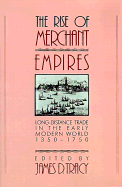Book contents
- Frontmatter
- Contents
- Preface
- Maps
- Introduction
- 1 Structural changes in European long-distance trade, and particularly in the re-export trade from south to north, 1350–1750
- 2 The growth and composition of trade in the Iberian empires, 1450–1750
- 3 The growth and composition of the long-distance trade of England and the Dutch Republic before 1750
- 4 France, the Antilles, and Europe in the seventeenth and eighteenth centuries: renewals of foreign trade
- 5 Productivity, profitability, and costs of private and corporate Dutch ship owning in the seventeenth and eighteenth centuries
- 6 The Dutch and English East India companies compared: evidence from the stock and foreign exchange markets
- 7 World bullion flows, 1450–1800
- 8 Merchant communities, 1350–1750
- 9 Economic aspects of the eighteenth-century Atlantic slave trade
- 10 Marginalization, stagnation, and growth: the trans-Saharan caravan trade in the era of European expansion, 1500–1900
- 11 The “decline” of the central Asian caravan trade
- 12 Merchant communities in precolonial India
- 13 Merchants without empire: the Hokkien sojourning communities
- Index
13 - Merchants without empire: the Hokkien sojourning communities
Published online by Cambridge University Press: 01 June 2011
- Frontmatter
- Contents
- Preface
- Maps
- Introduction
- 1 Structural changes in European long-distance trade, and particularly in the re-export trade from south to north, 1350–1750
- 2 The growth and composition of trade in the Iberian empires, 1450–1750
- 3 The growth and composition of the long-distance trade of England and the Dutch Republic before 1750
- 4 France, the Antilles, and Europe in the seventeenth and eighteenth centuries: renewals of foreign trade
- 5 Productivity, profitability, and costs of private and corporate Dutch ship owning in the seventeenth and eighteenth centuries
- 6 The Dutch and English East India companies compared: evidence from the stock and foreign exchange markets
- 7 World bullion flows, 1450–1800
- 8 Merchant communities, 1350–1750
- 9 Economic aspects of the eighteenth-century Atlantic slave trade
- 10 Marginalization, stagnation, and growth: the trans-Saharan caravan trade in the era of European expansion, 1500–1900
- 11 The “decline” of the central Asian caravan trade
- 12 Merchant communities in precolonial India
- 13 Merchants without empire: the Hokkien sojourning communities
- Index
Summary
Chinese merchants have long struggled against the orthodox Confucian view that they should be at the bottom of the sociopolitical scale. The agrarian empire was established by force of arms and run by a centralized bureaucracy. This empire soon developed strict controls over the sources of mercantile wealth and thereafter kept merchant families on the defensive. The underlying principle was that such families should not be allowed to use commercial wealth to acquire political power either directly through official appointments or indirectly through high social status. And as the mandarin state evolved through the centuries, military families also were ultimately excluded from political power, except during times of dynastic crises. The mandarins, selected largely from literati with or without landed wealth, became the embodiment of imperial authority and legitimacy. Merchants could not hope to challenge such a state structure. All they could hope for was to get some of the mandarins to collaborate in the acquisition of commercial wealth and to educate some members of their families to reach literati status and help to protect their enterprises.
Behind this overall framework, however, there were countervailing trends. For the first thousand years, from the Han to the Tang dynasties (from roughly the second century b.c. to the ninth century a.d.), the major pressures against mandarin power came from military families seeking to erect feudal structures. Merchants had no place in this struggle: their lowly status placed them with the artisans, even though their skills with money in an increasingly cash-based economy made them useful agents to powerful families from time to time.
- Type
- Chapter
- Information
- The Rise of Merchant EmpiresLong Distance Trade in the Early Modern World 1350–1750, pp. 400 - 422Publisher: Cambridge University PressPrint publication year: 1990
- 10
- Cited by



